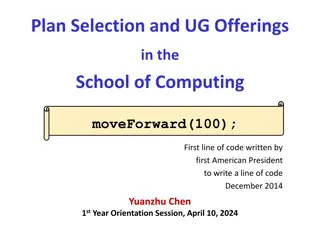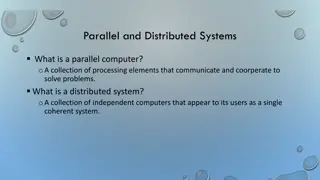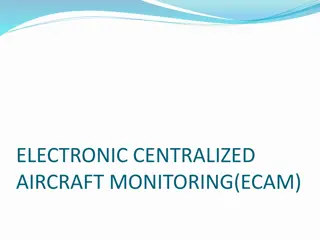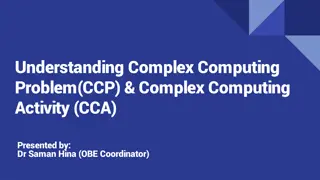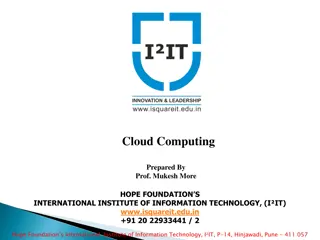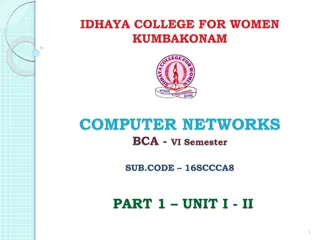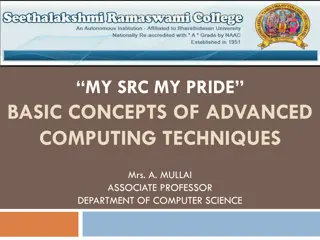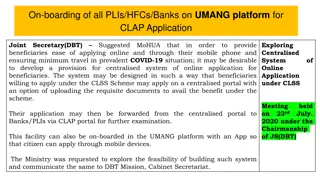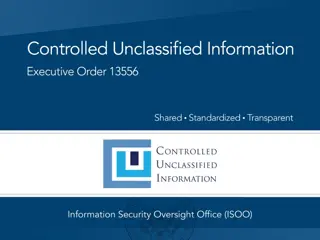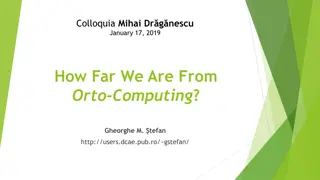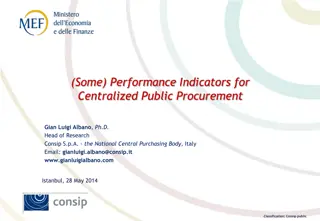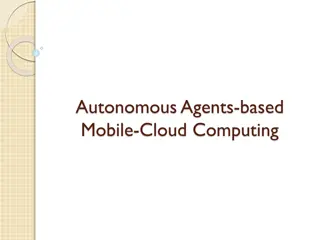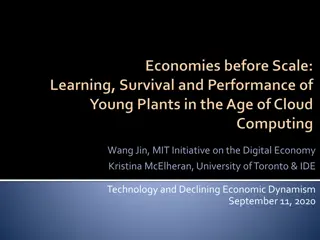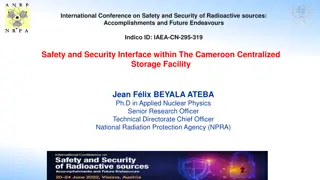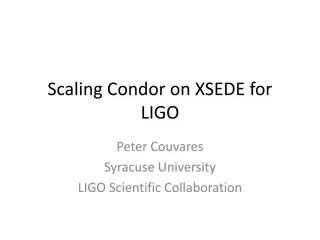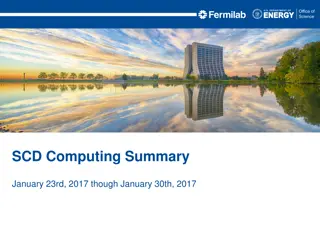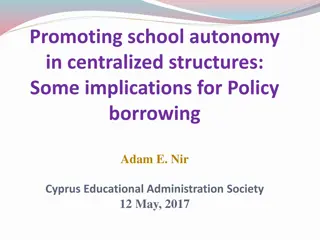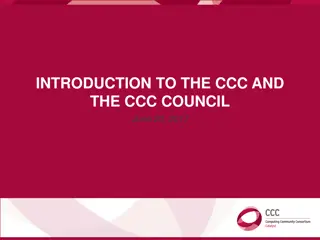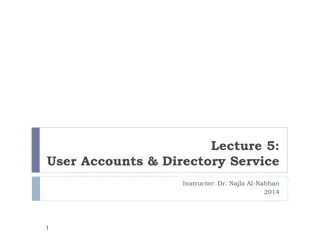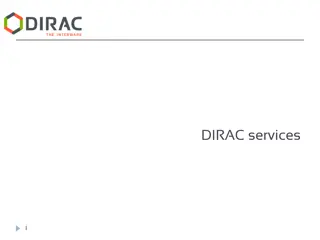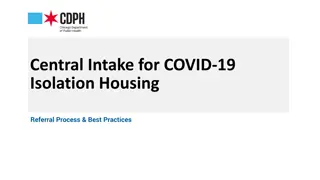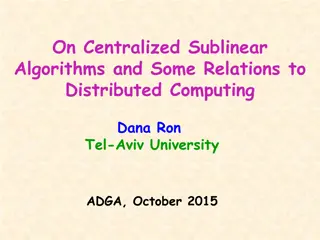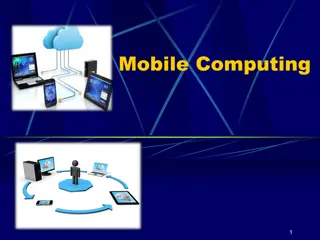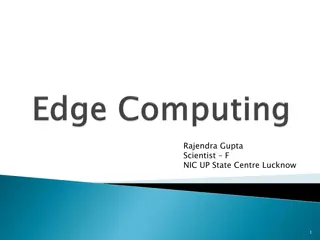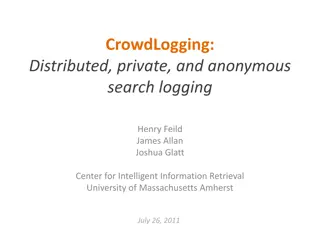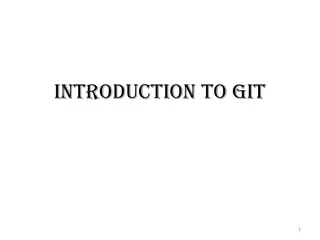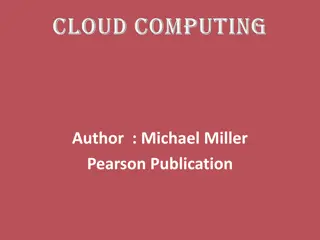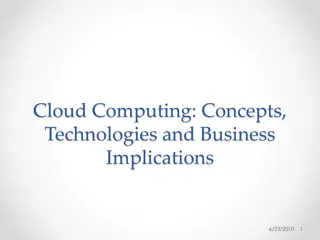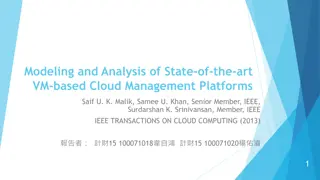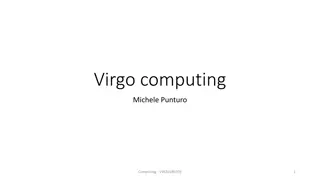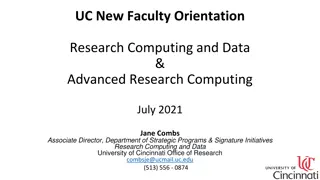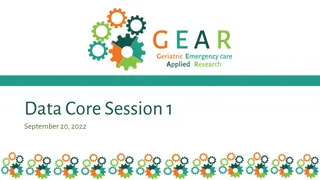Centralized Scheduling Request System (cSRS)
Centralized Scheduling Request System (cSRS) is designed to streamline rotation requests for students and ensure consistency across affiliate hospitals. It allows students to view available rotations in real-time, track their schedules, and prevents double booking. cSRS simplifies the process for bo
0 views • 24 slides
Computing Degree Plans and Offerings at School of Computing
Explore the diverse degree plans and offerings at the School of Computing, including Honours and General degrees, minors, and certificates in Data Analytics. Plan selection is crucial for advancing to second-year courses, with automatic acceptance and pending list options available. Discover the var
0 views • 20 slides
Centralized Excess Property Furniture Catalog and Warehouse Information
Detailed information about excess furniture stored at the Centralized Excess Property Operation's warehouse in Beltsville, MD. Includes a range of furniture items such as desks, credenzas, work stations, end tables, conference tables, storage cabinets, chairs, and more. Contact Leslie Fisher for app
0 views • 15 slides
Parallel and Distributed Computing Systems
In parallel computing, processing elements collaborate to solve problems, while distributed systems appear as a single coherent system to users, made up of independent computers. Contemporary computing systems like mobile devices, IoT devices, and high-end gaming computers incorporate parallel and d
2 views • 11 slides
Electronic Centralized Aircraft Monitoring (ECAM) Systems
Electronic Centralized Aircraft Monitoring (ECAM) is a vital system that collects data from sensors throughout the aircraft, processes it, and displays key information to pilots efficiently. The system is composed of various components like System Data Acquisition Concentrators (SDACs), Flight Warni
0 views • 6 slides
Eastmont Wellness Expansion Overview - September 2022
Eastmont Wellness is expanding its services to better serve patients in the Alameda Health System. The expansion includes a Dental Clinic, Eye Clinic, and Centralized Sterilization Hub. The Dental Clinic will offer adult services, the Eye Clinic will co-locate optometry and ophthalmology services, a
2 views • 6 slides
Understanding Complex Computing Problem (CCP) and Complex Computing Activity (CCA)
Dr. Saman Hina, along with Dr. Farrukh Arif and Dr. Maria Waqas, presents information on Complex Computing Problem (CCP) - a problem involving technical, computing, and other issues with no obvious solution, requiring deep knowledge and analytical thinking. CCP is evaluated through predefined rubric
4 views • 19 slides
Cloud Computing and Its Components
Cloud computing, offered by the Hope Foundation's International Institute of Information Technology, is Internet-based computing that involves remote servers sharing data-processing tasks and resources. Users can access software without local hardware requirements, empowering them with agility and e
1 views • 15 slides
Computer Networks in BCA VI Semester
Computer networks are vital for sharing resources, exchanging files, and enabling electronic communications. This content explores the basics of computer networks, the components involved, advantages like file sharing and resource sharing, and different network computing models such as centralized a
1 views • 96 slides
Basic Concepts of Advanced Computing Techniques
Delve into the world of advanced computing techniques with Mrs. A. Mullai as she discusses networks, computing, and pervasive (ubiquitous) computing. Discover how networks facilitate data exchange, the role of computing in designing hardware and software systems, and the trend of embedding computati
2 views • 40 slides
Cloud Computing, Edge Computing, and Their Applications
Cloud computing entails centralized processing of data on powerful servers, offering scalable resources over the internet. Edge computing brings processing closer to data generation points, reducing latency and enhancing security. Both paradigms cater to different needs such as IoT, autonomous vehic
0 views • 18 slides
Streamlining CLAP Application Process through Centralized System on UMANG Platform
Explore the feasibility of implementing a centralized online application system for beneficiaries applying under the CLSS Scheme through a central portal, integrated with UMANG platform. This system aims to simplify the application process, minimize travel during COVID-19, and provide easy access fo
0 views • 8 slides
Centralized Unified Information Program Overview
The Centralized Unified Information (CUI) Program aims to establish a uniform system for safeguarding and disseminating unclassified information across executive departments and agencies. Executive Order 13556 mandated the program to address the patchwork of policies present, promoting clarity, cons
2 views • 16 slides
Orto-Computing: Bridging the Gap Between Formal and Phenomenological Computing
Meaningful experiments suggest a transition from the formal, Turing-based approach to a structural-phenomenological one called Orto-Computing. This innovative concept integrates mind-matter interaction and non-formal functions within computational systems, offering potential solutions to complexity
0 views • 18 slides
Performance Indicators for Centralized Public Procurement
The presentation by Gian Luigi Albano, Ph.D., outlines performance indicators for centralized public procurement, including economic effects of demand aggregation, value for money, inclusion of SMEs, market dynamics, and transaction costs. It also discusses relevant performance indicators such as sa
0 views • 26 slides
Enhancing Mobile-Cloud Computing with Autonomous Agents Framework
Autonomous Agents-based Mobile-Cloud Computing (MCC) refers to moving computing tasks to powerful centralized platforms in the cloud, offering advantages like extending battery life and dynamic resource provisioning. However, an inflexible split of computation between mobile and cloud platforms lead
0 views • 22 slides
Impact of Cloud Computing Technology on Young Firms' Performance
The technology shock of cloud computing has significantly influenced the survival and performance of young firms. Young firms face higher uncertainty, benefit from experimentation, and are resource-constrained, making cloud computing's elastic, fast, and generic nature particularly advantageous. Thi
0 views • 21 slides
Safety and Security Measures at Cameroon's Centralized Storage Facility
The Centralized Storage Facility in Cameroon, established to manage disused sealed radioactive sources, incorporates safety and security measures in an integrated manner. The facility consists of ISO containers, alarm monitoring stations, and implements security enhancements based on IAEA guidelines
0 views • 15 slides
Scaling Condor on XSEDE for LIGO - Collaborative Computing Project
The project aims to evaluate the utilization of XSEDE resources by LIGO for large-scale computing tasks, with a focus on distributed computing challenges and fostering a research computing community. Various aspects such as political, cultural, and technical narratives surrounding the collaboration
0 views • 28 slides
New Centralized Eligibility Process (ODH Form 1341/1341A) for Take Charge!
Learn about the new centralized eligibility process for Take Charge! training, including who is required to take it, the goals and objectives, overview, general eligibility criteria, and options for determining Take Charge! eligibility.
0 views • 23 slides
Summary of SCD Computing Metrics and Scientific Computing for January 23rd - January 30th, 2017
This summary covers a range of topics related to scientific computing metrics and SCD computing services from January 23rd to January 30th, 2017. It includes details on service areas, offerings, job operations, resource provisioning, database management, system monitoring, and more. The summary also
0 views • 5 slides
Promoting School Autonomy in Centralized Structures: Implications for Policy Borrowing
Centralized educational structures face implications when promoting school autonomy. Policy borrowing highlights the need for change, initiation of educational policies, and international differences in implementation. The benefits and costs of buying in a shop versus going to a tailor parallel the
0 views • 26 slides
Overview of the Computing Community Consortium
The Computing Community Consortium (CCC) was established in 2006 under the Computing Research Association (CRA) to develop a vision for computing research and communicate it to stakeholders. It aims to align computing research with national priorities, encourage high-impact research, and groom new l
0 views • 48 slides
User Accounts and Directory Services in Network Computing
Explore the role of user accounts and directory services in network-centric computing infrastructure. Learn about Directory Servers, User Administration in Unix, and the concept of Group Accounts in Unix. Discover how Directory Services provide centralized repositories for managing information, enab
0 views • 9 slides
Advanced Cloud Computing Solutions with DIRAC Services
Explore advanced cloud computing solutions offered by DIRAC services at IN2P3, including maintenance, operation, VM scheduling, and contextualization. Learn about dynamic VM spawning, cloud endpoint abstraction, and virtual machine monitoring for efficient resource allocation. Stay updated on the la
0 views • 15 slides
Introduction to Mobile Computing Principles and Designing Mobile Applications
Mobile computing systems involve computing capabilities that can be utilized while on the move, leveraging wireless connectivity, small size, and mobile-specific functionalities. The history of mobile computing traces back to military origins and has evolved with technologies like GPS and wireless t
0 views • 98 slides
Introduction to Boston University's Shared Computing Cluster
Boston University's Shared Computing Cluster (SCC) provides researchers with access to a high-performance computing environment for running code, collaborating on shared data, and utilizing specialized software packages. With over 800 nodes, 20,000 processors, and hundreds of GPUs, the SCC offers re
0 views • 63 slides
Overview of Task Computing in Parallel and Distributed Systems
Task computing in parallel and distributed systems involves organizing applications into a collection of tasks that can be executed in a remote environment. Tasks are individual units of code that produce output files and may require input files for execution. Middleware operations coordinate task e
0 views • 17 slides
Centralized Referral Process for COVID-19 Isolation Housing
This resource outlines a centralized referral process for COVID-19 isolation housing in Chicago aimed at preventing the transmission of the virus. It covers eligibility criteria, housing options, and best practices for streamlining referrals, ensuring that residents who cannot safely isolate at home
0 views • 16 slides
Sublinear Algorithms and Graph Parameters in Centralized and Distributed Computing
Centralized sublinear algorithms and their relation to distributed computing are explored, emphasizing the efficiency of algorithms in processing large inputs in sublinear time. Examples of sublinear algorithms for various objects are provided, along with the computation and approximation of graph p
1 views • 34 slides
Exploring the World of Mobile Computing
Delve into the realm of mobile computing through this comprehensive presentation outline. Discover what mobile computing is, its applications, challenges, and the future of this technology. Compare mobile networks to wired networks, understand why going mobile is essential, and explore various types
1 views • 106 slides
Edge Computing for Optimizing Internet Devices
Edge computing brings computing closer to the data source, minimizing communication distances between client and server for reduced latency and bandwidth usage. Distributed in device nodes, edge computing optimizes processing in smart devices instead of centralized cloud environments, enhancing data
0 views • 32 slides
Distributed Search Logging: CrowdLogging vs. Centralized Model
CrowdLogging provides a distributed, private, and anonymous approach to search logging, contrasting with the centralized model that lacks user control and privacy. It offers advantages such as improved sharability and reproducible research results. The drawbacks of the centralized model include lack
0 views • 26 slides
Git: An Overview of Version Control Systems
Git is a powerful version control system that facilitates collaborative work and maintains a comprehensive history of project changes. It offers both Centralized and Decentralized/Distributed systems, with advantages and drawbacks for each. Centralized systems rely on a central server for collaborat
0 views • 37 slides
Introduction to Cloud Computing: A Comprehensive Overview
Cloud computing, a transformative technology, enables easy access to applications and data from anywhere in the world, promoting collaboration and efficiency. This chapter delves into the fundamentals of cloud computing, distinguishing it from traditional desktop computing and network computing. Und
0 views • 32 slides
Overview of Cloud Computing Technologies and Business Implications
Explore the concepts, technologies, and business implications of cloud computing through a discussion on multi-core processors, virtualization, cloud service models (IaaS, PaaS, SaaS), data processing models like MapReduce, and real-world case studies. Learn about the evolution of internet computing
0 views • 18 slides
State-of-the-art Analysis of VM-based Cloud Management Platforms
This study delves into the modeling and analysis of cutting-edge VM-based cloud management platforms, exploring topics such as cloud computing, cloud structure, types of cloud computing, key features of cloud computing, and examples from the cloud computing industry. It discusses Infrastructure as a
0 views • 40 slides
Overview of Virgo Computing Activities
Virgo computing has been a hot topic recently, with various discussions and meetings focusing on computing issues, future developments in astroparticle computing, and funding for INFN experiments. The activities include presentations, committee meetings, talks, and challenges in computing faced by V
0 views • 34 slides
Research Computing and Data Services at University of Cincinnati
Research Computing and Data (RCD) at the University of Cincinnati provides digital research infrastructure services to faculty, research staff, and students. They offer support for research projects, data management, analysis, visualization, and collaboration, along with access to high-performance c
0 views • 13 slides
Data Core Session 1
Resources for Alzheimer's research include data from the National Alzheimer's Coordinating Center (NACC) providing standardized clinical and neuropathological research data, the Standardized Centralized Alzheimer's and Related Dementias Neuroimaging (SCAN) project for neuroimaging data, and the Nati
0 views • 16 slides

